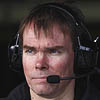


17/05/2013
NEWS STORY
 Heading to what many call the jewel in the crown of the Formula 1 season, Team Principal Eric Boullier talks tyres and hunger.
Heading to what many call the jewel in the crown of the Formula 1 season, Team Principal Eric Boullier talks tyres and hunger.
There's been a lot of talk about tyres and now it's been announced that there are changes to come; how does this sit with the team?
Eric Boullier: There aren't many sports where there are such fundamental changes to an essential ingredient part-way through a season. Just imagine for a moment that, because a football team can't run as fast as its opponent, the dimensions of the pitch are changed at half time! That there are changes to come can be seen as somewhat frustrating, and I hope they are not too extreme. It's clear that Pirelli have found themselves in a difficult situation and under pressure from different quarters. Last year, when we were designing our 2013 car, each team received information from Pirelli and everyone did the best job they could to develop a chassis which would make best use of the tyre characteristics.
We even ran with some experimental 2013 tyres at the end of last season, to assist us in confirming our development paths. As with every season, some teams do a better job than others with their designs, and some drivers are more adaptable than others to the changes of both car and tyre. It is frustrating when you've developed a car from a set of tyre specifications which are available to everyone - for tyres that are the same for everyone - to then be told that they are being changed mid-season. That said, we have a team of talented designers and engineers who will be working twice as hard to ensure we adapt to these changes in the most competitive manner.
Last year the team celebrated its 500th Grand Prix in Monaco; how would you rate the first races of the second 500?
EB: Since Monaco last year we've had twelve podium finishes including two wins - in Abu Dhabi last year and Australia this season - so we've been doing a pretty good job. Like everyone in motor racing, we're not entirely satisfied unless we're winning races and leading championships, so those are certainly what we're pushing for.
It was a short race for Romain in Barcelona; how do you ensure a failure like this doesn't happen again?
EB: It was frustrating for Romain and frustrating for the whole team. A Formula 1 car is made of so many components, and despite all the checks every once in a while a failure happens. Our technical team has taken immediate action, identified where the problem was and redesigned a new part for Monaco onwards.
For Kimi it was pretty much a perfect race again?
EB: It's clear that Kimi is driving very well at the moment and our car is capable of consistently delivering strong performance. There are some clear areas where we want to improve, with the car and with the team, but we have had a very strong baseline when we've visited every track so far this season; we're hopeful of the same in Monaco.
How has the team reacted to the changes to the technical department?
EB: We have a very strong technical department made of many people. It's an illustration of the strength of talent at Enstone that we were able to promote from within, and Nick Chester has been working on adopting his new role for some time now. We have plenty of upgrades to come for the E21, as well as the additional challenge of reacting to the forthcoming tyre changes. We're confident we can maintain performance and development with this year's car whilst at the same time developing an exciting car for 2014 and the new regulations.
What's the team's outlook right now?
EB: It's good that we're consistent, but we're greedy and want more wins. We are hungry for more points and we want to keep being in the battle at every race.
 Trackside Operations Director Alan Permane gives his insight ahead of Formula 1's trip to to the unique challenge that is Monte Carlo.
Trackside Operations Director Alan Permane gives his insight ahead of Formula 1's trip to to the unique challenge that is Monte Carlo.
Are there any goodies in the Monaco upgrade bag?
Alan Permane: Similar to Barcelona, we will be bringing a new rear wing which follows the same concept as the one we ran in Monaco last year. There will also be a new front wing and some modifications to the floor, so plenty to keep us occupied. We're confident in the upgrade package for this race and the car has worked well at every circuit so far this season, so there's no reason it won't be strong here.
Qualifying is a key element to a good weekend in Monaco; where do we stand?
AP: It's no secret that this is an area we've been looking to improve and we haven't done a bad job in this regard. We took a front row slot in China and - disregarding Mercedes - we were less than a tenth from the front runner in Spain. I wouldn't go as far as to say our qualifying pace is perfect as it's clear there are still gains to be made, but we've certainly made significant inroads into understanding how to get the most out of the tyres over a single lap, in addition to balancing setup for both qualifying and race pace.
How have the changes made to the sport in recent years altered the dynamic of racing in Monaco?
AP: A few years back I can honestly say we would head to Monte Carlo without even considering race performance. The entire weekend was focused on qualifying, with practice spent seeking nothing but ultimate pace on the minimum amount of fuel possible to complete a run. That isn't quite the case anymore, and this weekend will require a fair amount of assessment work with both tyre compounds. We ran the super soft compound in qualifying and briefly at the start of the race in Australia, with the same true of the soft in China, so our knowledge of their behaviour thus far is relatively limited. In recent years Monaco has generally proved to be a one stop race, so we'll need to ascertain what each compound is capable of ready for the race on Sunday.
Given the nature of Monaco, what are the race strategy considerations?
AP: At pretty much any other circuit where degradation is a factor, to a certain extent you can stop whenever you like, come out behind slower cars and overtake using DRS and so on. This simply isn't the case in Monaco. If you pit very early and come out behind the back markers, you're likely to be stuck there for lap upon lap; losing a vast amount of time in the process. Assuming a one stop race is a possibility, you need to calculate how early you can feasibly complete that stop without emerging in traffic, which is a fairly unique strategic challenge.
Track evolution is another frequently discussed factor in Monaco; how difficult is that to judge?
AP: I'd go as far as to say it's impossible to test any setup changes in Monaco. It's difficult enough at a normal circuit with stable conditions where you can test different things back-to-back and get a good understanding of performance, but here that simply isn't feasible and we have to approach the weekend with that in mind. There is far more value in ensuring the driver is comfortable and confident with the car than in aiming for the perfect aerodynamic or mechanical setup. Enabling the driver to get into a nice rhythm is essential, and you'll often see runs of ten to fifteen laps during practice aimed at achieving just that. If the driver can put together five laps in clear air to get himself fully into the groove, that's when you see the lap times start to come down and that's what makes for a good performance.
Pirelli has announced changes to the structure of its tyres; how will this affect the team?
AP: We've always maintained that we were perfectly happy with this year's tyres as they were. If you look back at the past couple of years since the start of the Pirelli era, the opening five races have historically featured higher levels of degradation than those seen during the rest of the season; with the exception perhaps of Suzuka. With that in mind, any alterations to the tyres should certainly be viewed with a degree of caution, as there is a real possibility that we could end up returning to one stop races; something that frequently occurred towards the end of 2012 as harder allocations were introduced. That's surely something that nobody wants to see. Of course, it's understandable that a repeat of the four stop scenario in Barcelona is not desirable, but along with Bahrain this represented perhaps the toughest challenge of the year. As we encounter circuits with lower demands on the rubber, and as teams start to get on top of this year's compounds, I'm certain that we would have naturally seen fewer stops anyway.